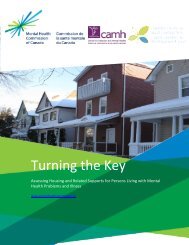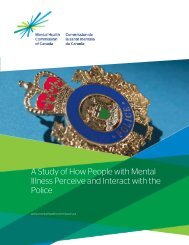Opening Minds Programs - Mental Health Commission of Canada
Opening Minds Programs - Mental Health Commission of Canada
Opening Minds Programs - Mental Health Commission of Canada
You also want an ePaper? Increase the reach of your titles
YUMPU automatically turns print PDFs into web optimized ePapers that Google loves.
<strong>Opening</strong> <strong>Minds</strong> <strong>Programs</strong> | August 2011<br />
Background<br />
Based on the recommendations <strong>of</strong> the 2006 Senate Committee report, Out <strong>of</strong> the Shadows at Last, the <strong>Mental</strong> <strong>Health</strong> <strong>Commission</strong> <strong>of</strong> <strong>Canada</strong> (MHCC) has<br />
been given a mandate by the Federal Government to develop an initiative to reduce the stigma and discrimination associated with mental health problems.<br />
Stigma comes from a Greek word referring to a mark or brand once burned into the skin <strong>of</strong> criminals or slaves so others knew to shun them. In today’s<br />
world, people living with mental illness are not identified with a visual marker; however, they are <strong>of</strong>ten labelled, stereotyped, and feared as if they were.<br />
Prejudice is the attitude; discrimination is the resulting behaviour. Prejudice and discrimination cause others to avoid living with, socializing with, or<br />
employing those who have mental health problems. Stigma is the primary reason two‐thirds <strong>of</strong> those living with a mental illness don’t seek help.<br />
Historically, stigma has also kept mental health issues in the shadows, away from the attention <strong>of</strong> the general public and <strong>of</strong>f the agendas <strong>of</strong> government<br />
policy makers.<br />
The scale <strong>of</strong> this issue is significant. More than seven million Canadians will experience a mental health problem in 2011. The WHO says by 2020,<br />
depression will be the second leading cause <strong>of</strong> disability worldwide after heart disease. Already the economic costs <strong>of</strong> mental illness in <strong>Canada</strong> total<br />
$51billion per year in lost productivity and healthcare services.<br />
Reducing stigma and eliminating discrimination is essential to building a person‐centered, recovery oriented, and culturally‐safe<br />
mental health system.<br />
Overview<br />
<strong>Opening</strong> <strong>Minds</strong> (OM) is the MHCC’s 10‐year anti‐stigma / anti‐discrimination initiative designed to change the attitudes and behaviours <strong>of</strong> Canadians<br />
towards those living the mental health problems. This will be the largest systematic effort to reduce the stigma <strong>of</strong> mental illness in Canadian history. Rather<br />
than re-inventing the wheel, OM intends to build on successful programs. However, very few anti-stigma programs in <strong>Canada</strong> have been scientifically<br />
evaluated for their effectiveness. At present, there is no best practice for reducing the stigma and discrimination associated with mental illness. One <strong>of</strong> the<br />
most promising practices is contact-based education, where people with a lived experience <strong>of</strong> mental illness share their stories and engage program<br />
participants in discussion. Our goal is to identify successful programs and replicate them nationally. We intend to use a number <strong>of</strong> vehicles to promote best<br />
practices, including the extensive stakeholder network which is developing around OM, development <strong>of</strong> toolkits, publishing reports in the scientific<br />
literature, conferences and education initiatives, and a public awareness campaign. OM is also identifying gaps and working with partners to address these<br />
issues. This staged approach with an emphasis on contact-based education has drawn the attention <strong>of</strong> the World Psychiatric Association, the Carter Institute<br />
(U.S.A.), and the Center for Psychiatric Rehabilitation at the University <strong>of</strong> Chicago.<br />
2








